
Guinea-Bissau, officially the Republic of Guinea-Bissau, is a country in West Africa that covers 36,125 square kilometres (13,948 sq mi) with an estimated population of 2,026,778. It borders Senegal to its north and Guinea to its southeast.
The music of Guinea-Bissau is most widely associated with the polyrhythmic genre of gumbe, the country's primary musical export. Tina and tinga are other popular genres.
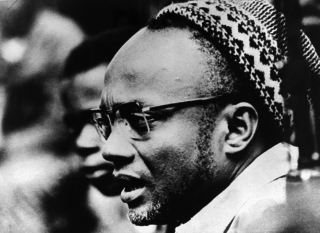
Amílcar Lopes Cabral was a Bissau-Guinean and Cape Verdean agricultural engineer, political organizer, and diplomat. He was one of Africa's foremost anti-colonial leaders. He was also a pan-Africanist and intellectual nationalist revolutionary poet.
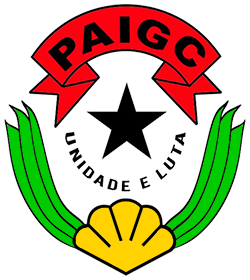
The African Party for the Independence of Guinea and Cape Verde is a political party in Guinea-Bissau. Originally formed to peacefully campaign for independence from Portugal, the party turned to armed conflict in the 1960s and was one of the belligerents in the Guinea-Bissau War of Independence. Towards the end of the war, the party established a socialist one-party state, which remained intact until multi-party democracy was introduced in the early 1990s. Although the party won the first multi-party elections in 1994, it was removed from power in the 1999–2000 elections. However, it returned to office after winning parliamentary elections in 2004 and presidential elections in 2005, since which it has remained the largest party in the National People's Assembly.

The Guinea-Bissau War of Independence, or the Bissau-Guinean War of Independence, was an armed independence conflict that took place in Portuguese Guinea from 1963 to 1974. It was fought between Portugal and the African Party for the Independence of Guinea and Cape Verde, an armed independence movement backed by Cuba, the Soviet Union, and Yugoslavia. The war is commonly referred to as "Portugal's Vietnam" because it was a protracted guerrilla war which had extremely high costs in men and materiel and which created significant internal political turmoil in Portugal.

Guinea-Bissau Creole, also known as Kiriol or Crioulo, is a creole language whose lexicon derives mostly from Portuguese. It is spoken in Guinea Bissau, Senegal and The Gambia. It is also called by its native speakers as guinensi, kriyol, or portuguis.
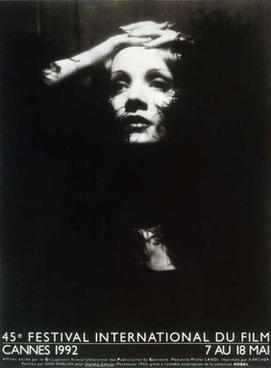
The 45th Cannes Film Festival was held from 7 to 18 May 1992. The Palme d'Or went to the Den goda viljan by Bille August.
Flora Gomes is a Bissau-Guinean film director. He was born in Cadique, Guinea-Bissau on 31 December 1949 and after high school in Cuba, he decided to study film at the Instituto Cubano del Arte y la Industria Cinematográficos in Havana.
The Two Faces of War is a 2007 Portuguese documentary film directed by Diana Andringa and Flora Gomes. The film was shot in Guinea-Bissau, Cape Verde and Portugal. The film includes a series of interviews and testimonies of people who lived through the period of the anti-colonial war and liberation in Guinea-Bissau.
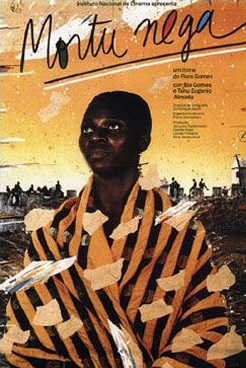
Mortu Nega is a 1988 historic film by Flora Gomes, a director from Guinea-Bissau. Mortu Nega was Gomes' first feature-length film and the first film produced in independent Guinea-Bissau. It was also the first the first ethnofiction film to show the experiences of the Guinea-Bissau War of Independence, blending contemporary history with mythology. Its world premiere was at the Venice Film Festival on August 29, 1988.
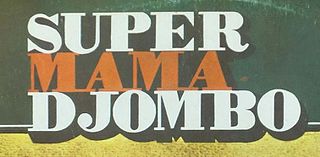
Super Mama Djombo is a band from Guinea Bissau who sing in Guinea-Bissau Creole. The band was formed in the mid-1960s, at a Boy Scout camp, when the members were only children. Mama Djombo is the name of a spirit that many fighters appealed to for protection during Guinea-Bissau's War of Independence.
African Film Festival, Inc. (AFF) is a non-profit cultural organization that presents an annual film festival and year-round community programs. Based in New York City, the organization was founded in 1990. The organization is dedicated to promoting greater understanding of African culture through film.
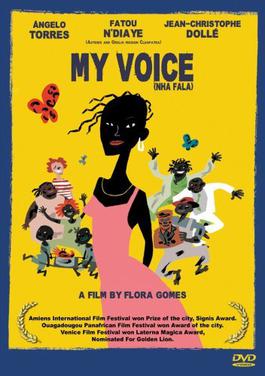
Nha Fala, English title: My Voice is a 2002 internationally co-produced musical film directed by Bissau Guinean director Flora Gomes. The movie stars Fatou N'Diaye, Ángelo Torres, Jean-Christophe Dollé and Bia Gomes.
Bissau is a city in Guinea-Bissau, a country in West Africa, formerly part of the kingdom of Kaabu and part of the Mali Empire.
Sana Na N’Hada is a filmmaker from Guinea Bissau, "the first filmmaker from Guinea-Bissau".
Po di Sangui, is a 1996 Bissau-Guinean–French drama film directed by Flora Gomes and produced by Jean-Pierre Gallepe. The film stars Dulceneia Bidjanque in lead role along with Djuco Bodjan, Dadu Cissé, Adama Kouyaté and Edna Evora in supportive roles.
Xime is a 1994 Bissau-Guinean drama film directed by Sana Na N'Hada.

Bissau-Guinean nationality law is regulated by the Constitution of Guinea-Bissau, as amended; the Bissau-Guinean Nationality Regulation, and its revisions; and various international agreements to which the country is a signatory. These laws determine who is, or is eligible to be, a national of Guinea-Bissau. The legal means to acquire nationality, formal legal membership in a nation, differ from the domestic relationship of rights and obligations between a national and the nation, known as citizenship. Nationality describes the relationship of an individual to the state under international law, whereas citizenship is the domestic relationship of an individual within the nation. Bissau-Guinean nationality is typically obtained under the principle of jus soli, i.e. by birth in Guinea-Bissau, or jus sanguinis, i.e. by birth in Guinea-Bissau or abroad to parents with Bissau-Guinean nationality. It can be granted to persons with an affiliation to the country, or to a permanent resident who has lived in the country for a given period of time through naturalization.

Karyna Gomes is a Bissau-Guinean singer and journalist of Cape-Verdean descent. She was the co-founder of the peace movement Miguilan or Minjderis di Guiné No Lanta. In 2021, she led the coordination of the first journalism projects in various types of Creole languages, which was developed with the help of the Portuguese online journal Mensagem de Lisboa. As a journalist, she has worked with organizations such as the Associated Press and RTP. She has released two musical albums since the start of her music career in the late 1990s.
The cinema of Guinea-Bissau arose along with the country's independence. Since the Guinea-Bissau War of Independence, film in the country has remained an underfunded state-controlled industry. The earliest filmmaking in the country was influenced by Amílcar Cabral's views on propaganda, and consisted of documentation of the war of independence. Although the war was documented by foreign filmmakers, Cabral arranged for the education of four young Bissau-Guineans in Cuba in film technique. Early Bissau-Guinean films were produced by this group, and consisted of propaganda documentaries about the revolutionary struggle, although much of their footage is now lost.











